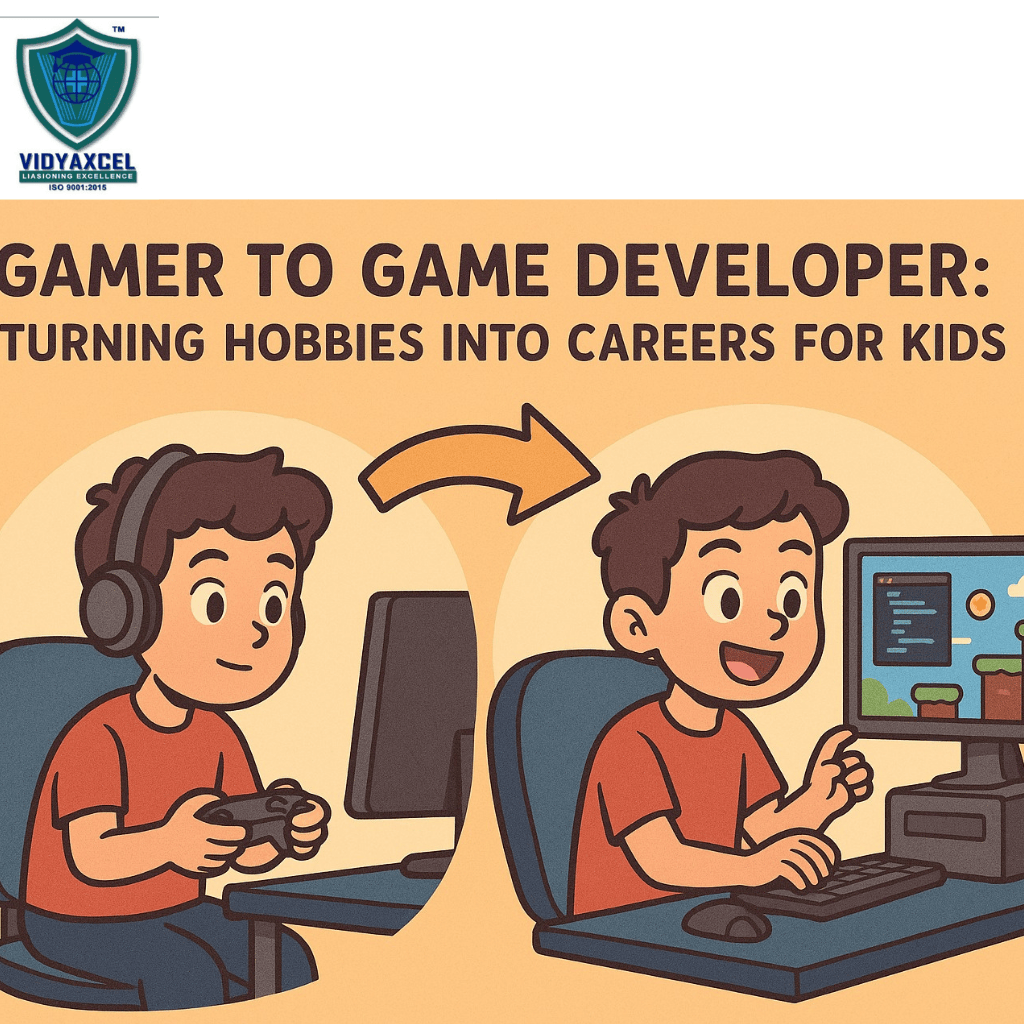Blog Details

05Apr
From Gamer to Game Developer: Turning Hobbies into Careers for Kids
In today’s digital world, many kids spend hours immersed in video games—battling enemies, building virtual worlds, and collaborating with friends online. While it’s easy for parents to worry about all that screen time, what if we flipped the narrative? What if instead of just consuming games, your child could create them? The gaming industry isn’t just booming—it’s evolving, opening up exciting, high-paying career paths for creative and tech-savvy individuals. And the best part? Many of the foundational skills your child needs to become a game developer are already being practiced every time they pick up a controller. In this post, we’ll explore how gaming can become more than a hobby, and how parents can nurture that interest into a real, future-ready career.
🕹️ From Gamer to Game Developer: Turning Hobbies into Careers for Kids
✨ Intro: The Gaming Generation
Start with some relatable stats or anecdotes:
- “Kids today aren’t just playing games — they’re living in them. But what if screen time became skill time?”
- Mention how gaming is now a $200+ billion industry, and game development is one of the hottest, fastest-growing career paths.
🎮 1. Understanding the Gamer Mindset
- How gaming builds problem-solving, creativity, teamwork (especially in multiplayer games like Minecraft, Roblox, Fortnite).
- Highlight how these are foundational skills in game design and development.
👨💻 2. What Do Game Developers Actually Do?
Break down key roles:
- Game Designers – the idea people
- Programmers/Developers – coders who build the engine
- Artists & Animators – visual creators
- Sound Designers
- Testers & QA Mention that even writing/storytelling is a huge part of game creation.
🧰 3. Skills Your Child Can Start Learning Early
- Coding: Python, C#, Unity, or even Scratch for younger kids
- Game design tools: Roblox Studio, Unity, Unreal Engine
- Artistic tools: Blender (3D), Photoshop, Procreate
- Storyboarding and storytelling
🎓 4. Courses, Camps, and Programs for Young Game Devs
- Online platforms like Code.org, Unity Learn, Udemy for kids
- Summer camps: iD Tech, Game Camp Nation, etc.
- Local workshops or clubs
- Even some high schools now offer game design electives!
🛠️ 5. DIY: Encourage Home Projects
- Let your kid build a game in Roblox Studio or Scratch
- Encourage YouTube tutorials to follow game builds
- Join game jams or online dev communities for kids
📢 6. How Parents Can Support Without Hovering
- Recognize gaming as a potential career, not just a time-waster
- Balance play with learning: “Play 1 hour, build 1 hour” approach
- Help them network early: online communities, forums, Discord servers (with supervision)
Conclusion
Gaming doesn’t have to be a distraction—it can be a direction. With the right tools, encouragement, and a bit of guidance, your child’s love for video games could be the gateway to a fulfilling career in game development. Whether they dream of designing the next big title, coding immersive virtual worlds, or creating epic game art, the opportunities are endless. As a parent, your role isn’t to pull them away from their interests, but to help them turn their passions into purpose. Because today’s gamer could very well be tomorrow’s game-changer.
FAQ’s
Is gaming really a legitimate career path for kids?
Yes! The gaming industry is now one of the largest entertainment industries in the world, employing developers, designers, artists, writers, testers, and more. With proper guidance, gaming can lead to real-world careers in technology, design, storytelling, and even entrepreneurship.
At what age should my child start learning game development?
Kids as young as 7–8 can begin exploring game development with platforms like Scratch or Roblox Studio, which are beginner-friendly and fun. As they grow, they can move on to tools like Unity, Unreal Engine, or Godot and learn real programming languages like C#, Python, or JavaScript.
How can I support my child’s interest in gaming without encouraging unhealthy screen time?
Try the “Play and Create” balance: For every hour they play a game, encourage them to spend time learning how games are made. You can also set screen time limits while offering structured learning resources that align with their interests.
Do they need to go to college to become a game developer?
While a degree in game design, computer science, or digital arts can be helpful, many developers are self-taught or have built portfolios through independent projects. What really matters is skills, experience, and a solid portfolio.
What are the career options in the gaming industry besides programming?
Lots! Your child could become a: Game designer, 3D artist or animator, Sound designer, Writer or narrative designer, Game tester (QA), UI/UX designer, Producer or project manager.
Our Office: West Bengal, Maharashtra & Delhi.
For More Infomation about admission in Medical, Engineering, Management & Study in Overseas Details.
View Current Study Overseas, Medical, Engineering & Management Admission Details Video.





